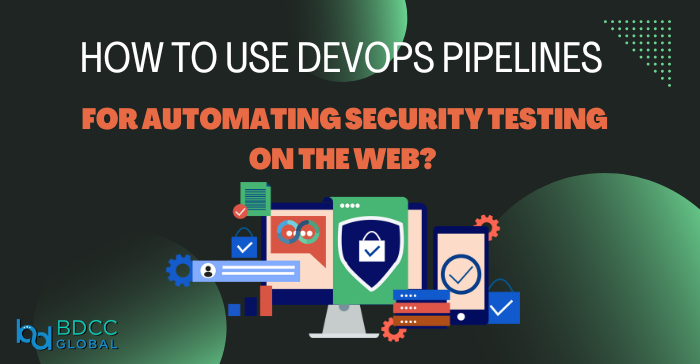
Do you plan to automate the Web App Security Testing process with CI/CD DevOps pipelines? Most of today’s organizations utilize DevOps for software development and infrastructure deployment processes. Still, many are missing out on enhancing Web Apps Security with DevOps!
DevOps CI/CD pipelines make the process of automation security testing easier with Unit Testing, Code Integration, and Acceptance Testing. Here we will discuss the importance of security testing and how DevOps can help Security Experts to automate the process.
“DevOps is the perfect solution to protect web apps from cyber-attacks with automation security testing.”
Why Perform Web Security Testing?
Web Security is crucial for every organization to ensure the safety of its web applications and websites. Hence, cybersecurity experts perform a comprehensive testing called “Security Testing” to strengthen the organization’s security posture with its internet-facing assets.
“Security Testing detects potential cyber risks and eliminates unethical hacking attempts through the Web.”
Cybersecurity engineers are constantly running test cases to protect the websites and web app APIs from SEO spamming, Google blacklisting, website redirection hacks, and online malware attacks. Isn’t that an efforts-driven job to perform continuously? DevOps pipelines introduce excellent capabilities to help Cybersecurity Engineers automate the testing of various web security processes.
A Quick Intro To DevSecOps
DevSecOps incorporates security testing and risk mitigation in the CI/CD pipeline workflow. It facilitates Continuous Testing so developers can fix security risks in real-time. It also provides continuous feedback loops with valuable insights that help the developers plan and execute test cases and production releases.
DevSecOps Continuous Testing aligns with the Continuous Integration processes for automating web security. DevOps Testing Engineers then divide the Continuous Testing processes into various categories to support Continuous Delivery.
Categorizing Security Testing Automation with DevOps Pipelines
DevOps CI/CD pipelines have the potential to automate many repetitive security testing tasks and test cases. Security Testing automation for the web can be categorized as follows:
Functional Security Testing
Automated functional security tests help detect potential security issues that may lead to unwanted data loss or third-party access. Like automated acceptance tests, functional tests target verifying the web app’s security features such as user authentication, sign-in logs, and logout. DevOps tools like Selenium or WebDriver can do the security testing using functions.
Non-functional Testing To Resolve Known Weaknesses
DevOps security test automation frameworks follow a hybrid approach to run non-functional test cases. With non-functional web security testing, the test engineers detect system weaknesses and misconfigurations that negatively affect the web performance. It includes detecting the HttpOnly flags on web session cookies, weak SSL suites, etc.
App Security Scanning
DevOps introduces an automated scanning technique to eliminate running manually driven penetration tests. Tools like Burp, Nessus, and OWASP ZAP integrate with the DevOps pipelines to perform real-time web app security scanning. This helps detect all exposed ports associated with the app’s IP address, HTTP services, and the web app’s response time.
Security Testing Web Application Logic
DevOps automated tools also detect security flaws in the web application logic, such as:
- HTTP request manipulation to bid on a website browsing request
- HTTP request to transact unwanted amounts online
- Transfer online funds to someone else using a negative number
Automating web app logic testing and security regression testing allows web applications to detect fraudulent cases.
When To Run The Web Security Tests?
Automating web security tests significantly reduces the cost and effort incorporated into running security tests manually. Instead, the automated security tests can be scheduled according to the business requirements. Here are the top three methodologies used to run automated security tests:
Code Review
DevOps engineers uncover and review potential vulnerabilities by modifying the web application source code through this security testing method. It helps identify hidden coding errors or bugs within the web service.
Vulnerability Analysis
It is part of the app security scanning process, leveraging DevOps automated tools. It is a continuous testing method running in the back end as DevOps CI/CD pipelines integrate new code logic in the source code.
Penetration Test
It indicates how vulnerable an existing website might be against malicious online attacks. It helps detect unauthorized access requests and reduces vulnerabilities in websites.
DevOps pipelines continuously run automated web security tests on the test, development, and production environments in real time. Since this activity costs nothing, automation test engineers only maintain the Script Runbooks.
How Web Security Tests Become Part Of the CD Process?
DevOps CI/CD creates branches under the same source code to facilitate Continuous Delivery with newer code integration and Continuous Testing. As everything happens under the same pipeline workflow, running, managing, and modifying the automated security tests is easy.
Security tests run parallelly with Continuous Integration to supervise the web app security. If the severity tests fail at any point, the development teams work on fixing the detected bugs and code errors. It stops the Continous Delivery workflow until the detected vulnerability gets removed.
Conclusion
With web app vulnerabilities on the rise, DevOps pipelines offer subsequent flexibility to integrate with automated testing tools and facilitate smooth security testing in real time. It helps web apps and websites stay protected from harmful attacks and potential data loss. It ensures the website’s and web app’s protection by following the best practices to perform code reviews, bug fixes, and source-code inventory management. Consult with expert DevOps professionals to automate the entire web security test workflow.
BDCC
Latest posts by BDCC (see all)
- Four Steps to Balance Agility and Security in DevSecOps - April 22, 2025
- Enhancing Security Posture with Azure’s AI-Driven Threat Detection - April 15, 2025
- Why Golang is Becoming the Go-To Language for DevOps Engineers - April 11, 2025

